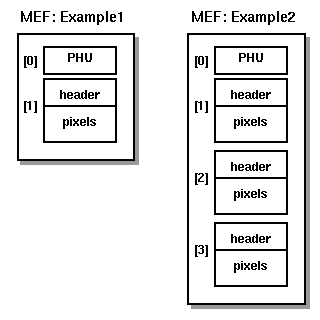Data Formats and Example Data
Data formats produced by Gemini facility instruments
Data from Gemini facility instruments are stored as Multi-Extension FITS (MEF) files. The data from a single "OBSERVE" command from the Observing Tool creates one MEF file. Each MEF file consists of one Primary Header Unit (PHU) and one or more extensions that contain pixel data. The extensions in MEF files are indexed from [0], which is the PHU. The extension numbers ([0], [1], etc.) in the figure below are shown to the left on each of the panel.

Additional information about the format of GMOS and NICI data is available (note that the NICI information is archived and not maintained, as the instrument was decommissioned).
Data formats produced by visitor instruments at Gemini
Data from the current visitor instruments are stored as simple FITS files. Each single FITS file consists of header information immediately followed by the pixel data, as shown in the figure below.

How to handle MEF files with IRAF
The Gemini IRAF package is written to handle the MEF files produced by the Gemini facility instruments. Most IRAF tasks can handle MEF files if the extension number is specified. However, some IRAF tasks that attempt to derive the output file names from the name of the input image may get confused by the extension number and/or add the extension number to the output file names. In such cases it is recommended to specify the output file names rather than let IRAF choose these based on the name of the input image.
Below are some examples of simple IRAF commands to access, display and manipulate MEF files. All examples assume that the IRAF imtype is set to "fits". This is done with the command
set imtype="fits"
The user may either include this command in the "login.cl" file, or issue it on the IRAF command line. If the command is issued on the command line, it needs to be followed by the command
flpr
in order to take effect.
These examples assume that the MEF file example1 has one pixel extension, and that the MEF file example2 has three pixel extensions, as shown in the figure above.
- To list the PHU of the MEF file example1:
- imhead example1[0] long+
- To list the header information of extension [1] of the MEF file example1
- imhead example1[1] long+
- To display extension [1] of the MEF file example1
- display example1[1] 1
- To copy extension [1] of the MEF file example1 to a simple FITS file
- imcopy example1[1] newimage
- To add extension [1] of the MEF file example1 and extension [2] of the MEF file example2 and save the output to a simple FITS file. This requires that the dimensions of the two extensions match.
- imarith example1[1] + example2[2] newimage
- To multiply each of the extensions in the MEF file example2 by extension [1] of the MEF file example1, overwriting the current extensions in the MEF file example2. This requires that the dimensions of the extensions match.
- imarith example2[1] * example1[1] example1[1,overwrite]
imarith example2[2] * example1[1] example2[2,overwrite]
imarith example2[3] * example1[1] example3[3,overwrite]
- imarith example2[1] * example1[1] example1[1,overwrite]